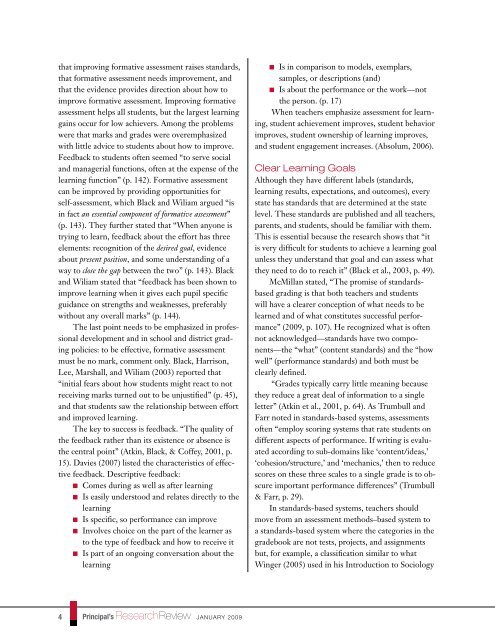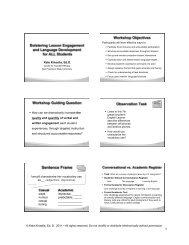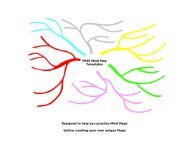Reforming Grading Practices in Secondary Schools - eStaffRoom
Reforming Grading Practices in Secondary Schools - eStaffRoom
Reforming Grading Practices in Secondary Schools - eStaffRoom
You also want an ePaper? Increase the reach of your titles
YUMPU automatically turns print PDFs into web optimized ePapers that Google loves.
that improv<strong>in</strong>g formative assessment raises standards,<br />
that formative assessment needs improvement, and<br />
that the evidence provides direction about how to<br />
improve formative assessment. Improv<strong>in</strong>g formative<br />
assessment helps all students, but the largest learn<strong>in</strong>g<br />
ga<strong>in</strong>s occur for low achievers. Among the problems<br />
were that marks and grades were overemphasized<br />
with little advice to students about how to improve.<br />
Feedback to students often seemed “to serve social<br />
and managerial functions, often at the expense of the<br />
learn<strong>in</strong>g function” (p. 142). Formative assessment<br />
can be improved by provid<strong>in</strong>g opportunities for<br />
self-assessment, which Black and Wiliam argued “is<br />
<strong>in</strong> fact an essential component of formative assessment”<br />
(p. 143). They further stated that “When anyone is<br />
try<strong>in</strong>g to learn, feedback about the effort has three<br />
elements: recognition of the desired goal, evidence<br />
about present position, and some understand<strong>in</strong>g of a<br />
way to close the gap between the two” (p. 143). Black<br />
and Wiliam stated that “feedback has been shown to<br />
improve learn<strong>in</strong>g when it gives each pupil specific<br />
guidance on strengths and weaknesses, preferably<br />
without any overall marks” (p. 144).<br />
The last po<strong>in</strong>t needs to be emphasized <strong>in</strong> professional<br />
development and <strong>in</strong> school and district grad<strong>in</strong>g<br />
policies: to be effective, formative assessment<br />
must be no mark, comment only. Black, Harrison,<br />
Lee, Marshall, and Wiliam (2003) reported that<br />
“<strong>in</strong>itial fears about how students might react to not<br />
receiv<strong>in</strong>g marks turned out to be unjustified” (p. 45),<br />
and that students saw the relationship between effort<br />
and improved learn<strong>in</strong>g.<br />
The key to success is feedback. “The quality of<br />
the feedback rather than its existence or absence is<br />
the central po<strong>in</strong>t” (Atk<strong>in</strong>, Black, & Coffey, 2001, p.<br />
15). Davies (2007) listed the characteristics of effective<br />
feedback. Descriptive feedback:<br />
n Comes dur<strong>in</strong>g as well as after learn<strong>in</strong>g<br />
n Is easily understood and relates directly to the<br />
learn<strong>in</strong>g<br />
n Is specific, so performance can improve<br />
n Involves choice on the part of the learner as<br />
to the type of feedback and how to receive it<br />
n Is part of an ongo<strong>in</strong>g conversation about the<br />
learn<strong>in</strong>g<br />
n Is <strong>in</strong> comparison to models, exemplars,<br />
samples, or descriptions (and)<br />
n Is about the performance or the work—not<br />
the person. (p. 17)<br />
When teachers emphasize assessment for learn<strong>in</strong>g,<br />
student achievement improves, student behavior<br />
improves, student ownership of learn<strong>in</strong>g improves,<br />
and student engagement <strong>in</strong>creases. (Absolum, 2006).<br />
Clear Learn<strong>in</strong>g Goals<br />
Although they have different labels (standards,<br />
learn<strong>in</strong>g results, expectations, and outcomes), every<br />
state has standards that are determ<strong>in</strong>ed at the state<br />
level. These standards are published and all teachers,<br />
parents, and students, should be familiar with them.<br />
This is essential because the research shows that “it<br />
is very difficult for students to achieve a learn<strong>in</strong>g goal<br />
unless they understand that goal and can assess what<br />
they need to do to reach it” (Black et al., 2003, p. 49).<br />
McMillan stated, “The promise of standardsbased<br />
grad<strong>in</strong>g is that both teachers and students<br />
will have a clearer conception of what needs to be<br />
learned and of what constitutes successful performance”<br />
(2009, p. 107). He recognized what is often<br />
not acknowledged—standards have two components—the<br />
“what” (content standards) and the “how<br />
well” (performance standards) and both must be<br />
clearly def<strong>in</strong>ed.<br />
“Grades typically carry little mean<strong>in</strong>g because<br />
they reduce a great deal of <strong>in</strong>formation to a s<strong>in</strong>gle<br />
letter” (Atk<strong>in</strong> et al., 2001, p. 64). As Trumbull and<br />
Farr noted <strong>in</strong> standards-based systems, assessments<br />
often “employ scor<strong>in</strong>g systems that rate students on<br />
different aspects of performance. If writ<strong>in</strong>g is evaluated<br />
accord<strong>in</strong>g to sub-doma<strong>in</strong>s like ‘content/ideas,’<br />
‘cohesion/structure,’ and ‘mechanics,’ then to reduce<br />
scores on these three scales to a s<strong>in</strong>gle grade is to obscure<br />
important performance differences” ( Trumbull<br />
& Farr, p. 29).<br />
In standards-based systems, teachers should<br />
move from an assessment methods–based system to<br />
a standards-based system where the categories <strong>in</strong> the<br />
gradebook are not tests, projects, and assignments<br />
but, for example, a classification similar to what<br />
W<strong>in</strong>ger (2005) used <strong>in</strong> his Introduction to Sociology<br />
4<br />
Pr<strong>in</strong>cipal’s ResearchReview january 2009






